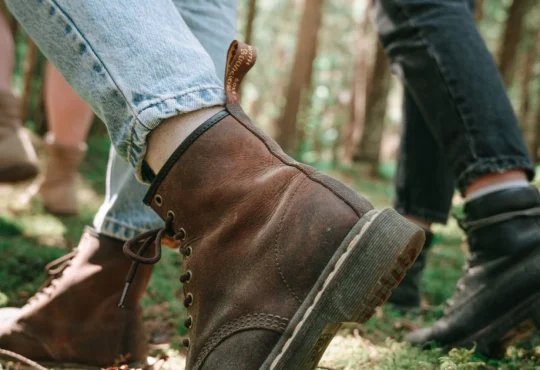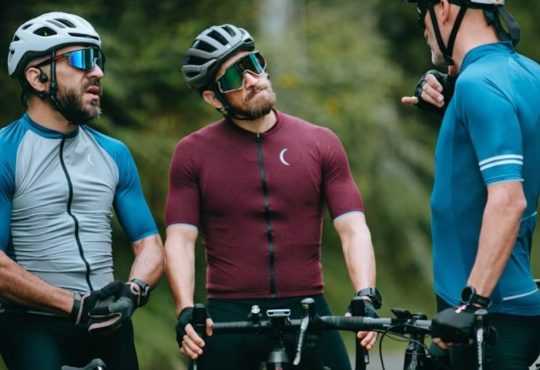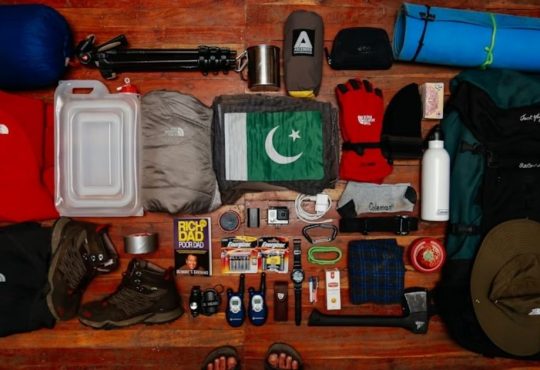Think about trading your phone screen for the open water, the buzz of a bite, and the simple thrill of catching—while actually feeling relaxed. That’s Recreational fishing, and believe it or not, millennials are turning to it more than ever. It’s easy, rewarding, and refreshingly real in today’s hyperconnected world.
In the next few minutes, you’ll discover why Recreational fishing is a game-changer: from boosting your mood and health to building community and conservation awareness. Ready to see why this low-pressure pastime is worth grabbing your rod today? Stick around—you might be hooked.
1. What Is Recreational Fishing?
Recreational fishing—also called sport or leisure fishing—is the act of catching fish for personal enjoyment rather than for selling or making a living. It’s all about relaxation, fun, and the overall experience, whether you’re fishing from a boat, a dock, a shoreline, or even through the ice in winter. People do it to spend peaceful time in nature, bond with family and friends, or simply enjoy a break from busy everyday life. Unlike commercial fishing, which focuses on quantity and profit, Recreational fishing is about the thrill of the catch, the quiet moments in between, and the satisfaction of being outdoors. Some anglers release their catch, while others cook it up for a fresh meal—both ways are part of the fun.
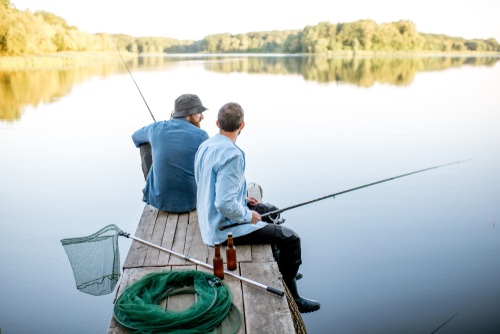
2. The Rise of Recreational Fishing Among Millennials
Millennials (ages 29–44) once made up nearly 30% of anglers, but their participation dropped to around 13% between 1980 and 2011, largely due to urbanization, shifting lifestyle priorities, and increased screen time. However, things are changing. Targeted efforts—like Idaho’s 2024 “Fish Idaho” campaign—helped reverse this trend by boosting millennial fishing license sales by 2%. These programs focused on making fishing more social, inclusive, and Instagram-worthy, helping younger adults see it as a meaningful and modern outdoor activity.
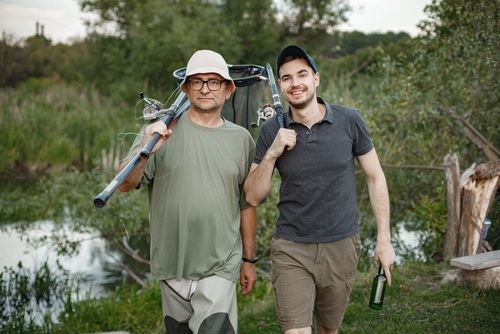
Then came the pandemic. During COVID-19 lockdowns, over 55 million Americans turned to fishing—the highest participation rate in over a decade. For millennials in particular, Recreational fishing offered a safe way to escape screens, reduce stress, and reconnect with nature, all while following social distancing guidelines. It became more than a hobby—it became a healthy, mindful escape in uncertain times.
3. Why Millennials Are Hooked on Recreational Fishing
Several key reasons explain why Recreational fishing fits so well with millennial lifestyles:
• Health and Mental Boost
Fishing is known to lower anxiety, depression, and even suicidal thoughts—regular anglers had a 17% lower risk compared to non-anglers, according to mental health studies. The repetitive motion of casting, the calming sound of water, and the focus required during fishing act as a natural form of mindfulness. For millennials juggling work stress, social media burnout, and constant connectivity, spending a few quiet hours by the water can feel like a mental reset.
• Easy Access and Flexibility
With busy schedules and tight budgets, millennials love activities that are low-cost and easy to plan. Recreational fishing checks both boxes. Whether it’s a spontaneous evening at a local pond or a weekend trip to the coast, it doesn’t require much planning or physical effort. You can fish solo, go with friends, or even join a group—all at your own pace.
• Social Connection
Fishing may seem like a solo activity, but it’s actually a great way to bond. Sitting by the water offers uninterrupted time to talk, share stories, or just be present with friends and family. Millennials value experiences over things, and fishing provides that quality time—plus, there’s always the chance to snap a photo of a catch and share it online.
• Conservation-Friendly
Many millennials care deeply about sustainability, and Recreational fishing supports that mindset. Every fishing license and gear purchase contributes to conservation funding—around $600 million per year goes to maintaining fish habitats, clean water, and wildlife programs. Many young anglers also practice catch and release, helping preserve fish populations for future generations.
• Tech-Infused Tradition
Technology has made fishing more engaging and accessible. From YouTube tutorials and TikTok fishing hacks to mobile apps that track your catches or recommend local hotspots, fishing is no longer seen as old-fashioned. Millennials are blending tradition with tech, using digital tools to learn quickly and connect with a wider fishing community online.
4. Top 10 Benefits of Recreational Fishing
- Mental wellbeing – Recreational fishing is known to reduce stress, anxiety, and even symptoms of depression. According to studies cited by Fox News, anglers experience better overall mental health, partly due to the calming nature of being near water and away from digital distractions.
- Physical activity – While it’s not an intense workout, fishing includes light exercise like walking to your spot, casting your line, and reeling in fish. It’s a great way to stay active without hitting the gym—and a healthier alternative to endless scrolling.
- Social moments – Fishing naturally brings people together. Whether you’re teaching your kids to cast, enjoying a peaceful morning with a partner, or chatting with fellow anglers, it creates space for real conversations and shared memories.
- Connect with nature – Being outdoors is a big part of the experience. The fresh air, natural sounds, and surrounding wildlife help you feel grounded. It’s a break from city life that offers peace and a deeper appreciation for the environment.
- Learn new skills – Fishing isn’t just about casting a line. You’ll pick up skills like knot tying, reading the water, identifying fish species, and even understanding weather patterns. It’s a fun way to keep learning without it feeling like work.
- Personal reflection – Many anglers say their best thinking happens by the water. Whether you’re setting goals, processing thoughts, or simply enjoying the silence, fishing gives you space for personal growth and mental clarity.
- Affordable hobby – You don’t need to spend a fortune to get started. Basic gear can cost under $100, and fishing licenses are usually budget-friendly. Once you have your setup, most fishing spots—like lakes and piers—are free or low-cost to access.
- Conservation contribution – Every time you buy fishing gear or a license, a portion goes toward wildlife protection and habitat restoration. Recreational fishing supports programs that keep fish populations healthy and water systems clean.
- Potential prize catch – There’s a unique thrill in catching a fish, especially when it’s a big one. It brings a sense of achievement and excitement, whether you release it or cook it up for dinner.
- Digital shareability – Millennials love sharing experiences, and fishing provides plenty of photo-worthy moments. From beautiful landscapes to your latest catch, it’s perfect content for Instagram, TikTok, or group chats.
5. How to Get Started with Recreational Fishing
Step 1: Get a License
Before you cast a line, make sure you’re fishing legally. Most states require a fishing license, which you can get online through state wildlife or parks websites like stateparks.gov or takemefishing.org. Licenses are usually affordable, and some states offer short-term or beginner options if you just want to try it out first.
Step 2: Buy Simple Gear
Don’t worry about fancy equipment at the start. A basic spinning rod and reel combo is perfect for beginners and widely available at sporting goods stores or online. Pair it with a 10–15 lb monofilament line, some hooks, sinkers, bobbers, and you’re ready to go. Live bait like worms is easy to use and effective, but you can also try basic soft plastic or spinner lures. Staff at local tackle shops are often happy to guide new anglers.
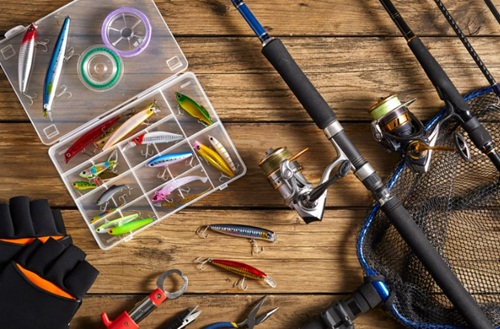
Step 3: Learn the Basics
You don’t need to be an expert—just learn a few key skills to start. Practice casting in your backyard or at a quiet park. Watch quick YouTube videos to master two essential knots: the improved clinch knot and the Palomar knot. Finally, check your local fishing regulations to understand what species are in your area, what size you can keep, and how many fish you’re allowed to take home.
Step 4: Pick a Spot
You don’t need a boat or a remote location to enjoy fishing. Public lakes, ponds, rivers, or community fishing piers are excellent for beginners. Many state wildlife agencies list nearby spots, and local Facebook or Reddit fishing groups often share helpful advice on where to go and what’s biting.
Step 5: Focus on the Experience
Fishing is about more than catching fish—it’s about relaxing and disconnecting. Dress comfortably for the weather, bring along snacks, water, sunscreen, and maybe a folding chair. Be patient and keep your expectations simple. Even if you don’t catch anything, the calm atmosphere and natural surroundings make it time well spent.
6. Overcoming the Challenges
Getting into Recreational fishing can feel a bit overwhelming at first, especially with a busy schedule or lack of experience—but these challenges are easier to overcome than you might think.
- Time constraints? You don’t need an entire day. Even a 2-hour trip after work or an early morning session on the weekend can help you unwind and get your line in the water. Fishing fits well into short, flexible time slots, making it easy to build into your routine.
- No fishing buddies? No problem. Fishing is one of the few activities that works great solo. It’s peaceful, distraction-free, and gives you space to think. That said, if you’re looking for company, beginner-friendly fishing clubs, local meetups, or online communities are a great way to connect with others and learn faster.
- Too busy? Think of fishing as a break your brain needs. A quick trip to a local pond or pier can refresh your mind more than scrolling on your phone or binge-watching another show. It’s not about how long you go—it’s about being present while you’re out there.
According to the American Sportfishing Association (ASA), time is the most common reason people stop fishing—even though it’s also one of the easiest things to adjust. Instead of waiting for the “perfect” weekend, aim for short, meaningful outings. Fishing once a month is still better than not fishing at all.
7. The Broader Impact of Recreational Fishing
Economic Contributions
Recreational fishing does more than provide personal joy—it plays a major role in the U.S. economy. This hobby generates around $125 billion each year, supporting over 800,000 jobs in areas like tourism, retail, equipment manufacturing, and guide services. It also contributes approximately $38 billion in wages, helping small businesses, local bait shops, and travel-related services in both rural and urban areas. Whether you’re buying a fishing rod, booking a cabin, or fueling up your car, you’re part of a massive economic engine.
Conservation Power
Beyond the dollars, Recreational fishing is a major force for environmental protection. Every purchase of rods, reels, tackle, and licenses contributes to conservation through federal excise taxes and state programs. More than $600 million is raised annually to support fish hatcheries, habitat restoration, and clean-water initiatives. With millennials and younger anglers joining the scene, this funding stream is becoming more diverse and sustainable. Their involvement helps ensure long-term support for fish populations, clean lakes and rivers, and protected natural spaces for generations to come.
8. The Future of Recreational Fishing for Millennials
Although millennial participation in Recreational fishing declined over the years, targeted outreach—such as Idaho’s millennial-focused campaigns and the surge of interest during the COVID-19 pandemic—has helped reignite enthusiasm. These efforts showed that when fishing is marketed as an experience rather than a sport, younger generations are more likely to get involved.
Looking ahead, we can expect to see more diverse and inclusive participation, especially as more women and people of color discover the benefits of fishing. Brands and outdoor organizations are already highlighting female anglers and creating spaces that feel welcoming for everyone. At the same time, millennial values like sustainability, mindfulness, and eco-conscious spending align naturally with the core of Recreational fishing.
Speculation: With the rise of easy-to-use fishing apps, smart gear, and urban fishing programs popping up in city parks, Recreational fishing is becoming more accessible than ever. Social media will continue to play a big role in sharing the experience, and by 2030, fishing could be seen as a go-to wellness activity—just like hiking or yoga—for younger generations looking to unplug, recharge, and reconnect with nature.
Tips to Make Recreational Fishing Fun and Link It to Your Life
Recreational fishing becomes even more enjoyable when you find ways to connect it with your everyday life. Whether you’re looking for quality family time, want to contribute to the environment, or enjoy using tech to enhance your hobbies, there are plenty of ways to make fishing more meaningful and fun.
Social/Family Ideas
Fishing is a great way to spend time with loved ones, build traditions, and make memories.
Host a Sunset Fishing Meetup: Choose a calm lake or pier, invite a few friends, bring folding chairs, snacks, and drinks, and enjoy the peacefulness as the sun sets. It’s a relaxing way to bond without the pressure of a packed schedule.
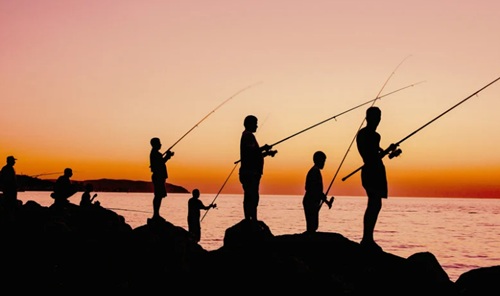
Plan a Holiday Fishing Trip: Use special occasions like Mother’s Day, Father’s Day, birthdays, or even casual weekend getaways to organize a fishing trip. It’s a thoughtful and refreshing gift experience that everyone can enjoy together.
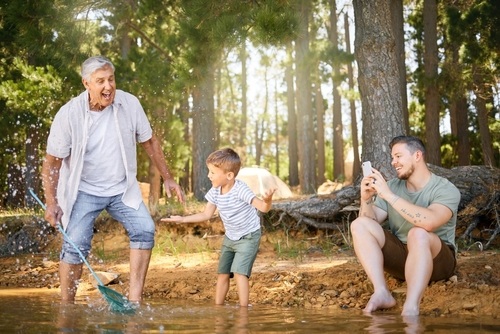
Join “Fish and Cook” Potluck Events: Some local groups or online communities organize cookouts where people share what they caught and trade simple recipes. It’s a fun and tasty way to turn fishing into a social celebration. Don’t see one near you? Start your own with neighbors or co-workers!
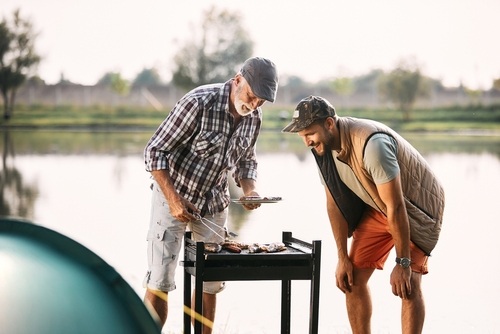
Nature & Conservation
Fishing and nature go hand-in-hand, and many anglers take pride in giving back to the environment they enjoy.
-
Volunteer for Shoreline Clean-Ups: Join a local cleanup day or pick up litter during your fishing trip. It keeps the water clean and shows respect for wildlife and fellow anglers.
-
Practice Catch and Release When Possible: Use barbless hooks or handle fish gently if you’re letting them go. It’s a small step that helps protect fish populations, especially in heavily fished areas.
-
Bring a Friend and Pass It On: Teaching someone how to fish not only helps them enjoy the outdoors but also builds a stronger, more sustainable fishing community. Share tips, explain local rules, and enjoy the learning process together.
Tech-Friendly Ways to Stay Engaged
If you love apps, gadgets, and sharing your journey, there are plenty of tools to enhance your Recreational fishing experience.
-
Use Fishing Apps to Log Catches: Apps like Fishbrain, ANGLR, or My Fishing Advisor let you track what you catch, where, and under what conditions. Over time, this helps you understand patterns and improve your technique.
-
Capture and Share the Moments: Whether it’s your first fish or the view from your fishing spot, snapping photos or recording short videos makes the experience fun and shareable. Use social media to connect with other anglers or document your journey.
-
Check Reviews and Tutorials Before You Buy: Not sure which rod, reel, or bait to try? Platforms like YouTube, Reddit, or fishing forums are full of gear reviews, how-to videos, and honest advice from people with hands-on experience. It helps you avoid beginner mistakes and get more value for your money.
-
Explore Smart Fishing Gear: If you’re into gadgets, consider trying smart bite alarms, digital fish finders, or casting drones (yes, they exist!). These tools add a modern twist and can be especially helpful if you’re fishing in new or unfamiliar waters.
By mixing traditional fishing with your own lifestyle—whether it’s social, tech-savvy, or conservation-minded—you’ll make the hobby more rewarding and personal. Recreational fishing isn’t just about catching fish—it’s about creating experiences that stick with you long after the line is reeled in.
Conclusion
Millennials are rediscovering Recreational fishing not just as a hobby, but as a gateway to better mental health, deeper relaxation, real-life connections, and environmental impact. It’s accessible, affordable, and fits right into modern values and lifestyles. As more young people take to the water, fishing’s popularity among millennials will likely rise—and with that will come bigger community, conservation, and cultural benefits.
So, grab a rod, get a license, and try Recreational fishing today. You might reel in more than you expected: tranquility, connection, and maybe even a great story to share. Give it a shot—you may never look at weekends the same way again.
Sources:


